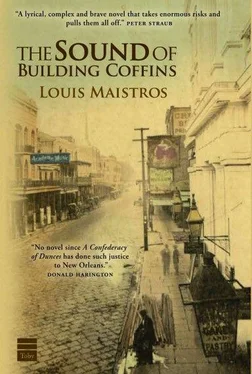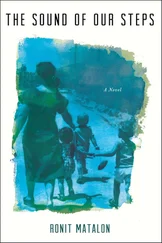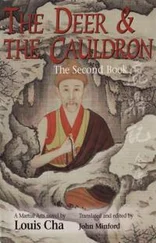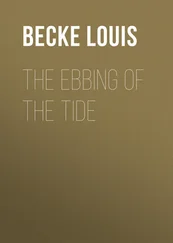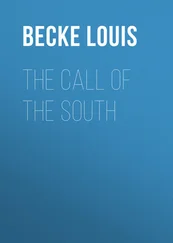Flit, flit, with the hurrying hours,
In shadow and mist and dew
Will-o’-the-Wisp, O Will-o’-the-Wisp,
I could I would follow you,
With your elfin light for a lantern bright
The bogs and the marshes through
Will-o’-the-Wisp, O Will-o’-the-Wisp,
I could I would follow you
Now there was a whistle of breeze where there was no breeze, the voice of the night whisperer. A dry whistling coming up from the orange water, solidifying and stretching from tin to brass. Music of some kind, vaguely familiar.
“Just the morphine is all,” he said aloud. “It’ll pass soon enough.”
“Mister Beauregard, can you hear me?” A voice not his own brushed past his ear. Like the music: familiar .
“Just the morphine,” answered Beauregard, unable to believe anything save for the terrible weight in his chest.
“Step down, old friend. Into the water.” Antonio’s voice was clear now, no longer a whisper. “Step down. It’ll be all right. I have something to show you.”
Beauregard placed a foot in the water. Something at the back of his mind warned of quicksand, told him not to go too far and be damn careful if he did-the wispy roots of alligator weed would not keep him from being sucked down and in if he faltered. He took three steps and stopped, lowering himself to his hands and knees to distribute his weight, to avoid sinking. Quiet. Nothing. Then:
“Don’t be afraid,” said Antonio.
The left hand of Antonio Carolla shot up and out of the water with a splash, hooking firmly behind Beauregard’s neck, pulling him down, under. Beauregard struggled; slapped at the hand, pulled at it, writhed in the water-uselessly.
“Open them,” Antonio whispered into Beauregard’s ear. Beauregard’s thrashes lessened as he pondered the instruction-wondering what might be closed that could be opened. Snatching the thought from Beauregard’s mind, Antonio amended:
“Your eyes. Open your eyes.”
Chapter thirty-two. Two Seconds Past Now
With the opening of eyes, there is change. The change is not in raw perception; optic, tactile, or other. It is dark with eyes closed, but darker still when truly opened.
There is no hand hooked behind Beauregard’s neck. No sound of splashing, no feeling of panic in his heart, no water, no need to hold breath, nothing left to struggle against. He is kneeling on a hard surface, a stone floor. There’s a terrible odor in his nostrils, a smell rushing forward from his personal history, a familiar smell. He pulls himself to his feet, takes a single step forward, hands groping before him in the dark. On the third step his left shin knocks painfully into something hard, angular.
“God damn ,” he complains aloud, reaching down to rub his leg. The pain is a small miracle, taking his mind off larger concerns in the now. But now exits too quickly, strange new reality rushing forward two seconds past now.
“’Tonio!” he bellows loudly, irritated. “What the hell, man? What’s going on?” No response, not even an echo. He draws down a hand to investigate the hard object that knocked his shin. Hard edges, soft on top. He places both hands on it. Leans on it. Its voice is a creak. The sound of rusty springs.
Cot.
The meaning of the smell reveals itself:
Bucket .
His hands trace the walls around him, measuring their distance from one to the other. Eight feet from here to there. Four feet from there to here. He reaches upwards, touches finger to ceiling. Seven feet from floor to ceiling, give or take.
Standard.
“’Tonio!” he shouts once more. Then: “AN-TOE-KNEE-OH!” for good measure. No response.
“Think,” he insists of himself. A sob creeps slowly up his throat. “This is the morphine,” is the only answer he can imagine. “Just the morphine. Took too much is all. I just have to sleep it off. When I wake up, I’ll be back in my swamp. With a big, fat headache maybe, but back in my swamp. My bayou, my beautiful, beautiful bayou.” He sits on the cot and rubs roughly at the wetness of his eyes.
Upon lifting hands from eyes, Beauregard Church sees the familiar starburst patterns that every human being sees after rubbing his or her eyes in the dark. Pinpricks of light poking tiny holes through internal darkness, exposing little bits of artificial white, dancing grains of electric salt. But the pinpricks are not all white; there are grays and colors among them. The white is not artificial: there is purpose, there is revelation, they are stripping away blackness a crumb at a time. They fade, disappear-too soon, too soon. He rubs his eyes once more, pinpricks resurrected. This time they don’t fade. This time they widen and multiply rapidly, eating away at darkness like a cancer, tearing away blackness, stripping its skin. There is meaning in the grays and the colors. They are combining to form the figure of a man.
The cell is now illuminated with bright, sourceless light. Beauregard examines his naked feet. He’d never imagined how godawful the inside of these cells might be in bright light. He decides utter darkness had been a mercy for the prisoners after all. He looks up.
The figure revealed is Antonio Carolla. Antonio stands by the bucket, leaning against the far wall of the small cell. His eyes meet Beauregard’s.
“You can see me?” Antonio asks calmly.
“Yeah. Yeah, Antonio. I can see you just fine.”
“Sorry about the trouble, old friend,” the ghost of Antonio Carolla says with soulful eyes. “Being born can be as painful for the child as for the mother. Well, not born so much as reborn. Or rebirthed , as the Mulatto kid says.” Antonio is smiling. “Kid thinks he’s an orphan.” Antonio is laughing. The Sicilian’s words mean nothing, but his smile puts Beauregard at ease.
“Guess so,” says Beauregard, without the slightest idea of what Antonio is talking about, feeling suddenly exhausted. “Antonio, I think I need to sleep.”
“You are asleep, old man.” Antonio steps forwards, sits next to him on the cot. Puts his arm around him, the arm minus a hand. “Listen, Mister Beauregard.” Beauregard prefers it when Antonio calls him Bo-Bo, “Mr. Beauregard” being what the prisoners used to call him. “I know this is hard for you to take in. It was hard for me too at first. But listen to the song; it’s a familiar tune, a good tune.”
“I don’t understand,” he replies, but he does hear music. It’s not so much a sound as a feeling.
“You don’t need to. Not yet. You just need to understand that you’ve lived for a reason, and now you’re moving on for a reason. You need to fix some hearts, make things right.”
“I’m dead?”
“Bo-Bo, I’m worried about my boy. He grew up bad, but through no fault of his own.” Antonio pauses then says in a low voice, “My wife, she tries, but she is weak and he is strong-willed. She can’t control him.”
“I don’t know nothin’ of your boy, Antonio. I been in the swamp since that demon got pulled out of him. Since I killed that man. Since I made those kids orphans.”
“He grew up bad,” repeats the Sicilian, ignoring Beauregard’s confession. “His heart struggles with demons. My own hand struggles within his heart. It burns. And Typhus is no orphan. Didn’t you know that?”
Beauregard’s head is swimming, unable to understand, and so he cuts to the chase: “What do you want me to do, Antonio? What can I do?”
“There’s a woman who brought a destructive thing into the world, and into my little Dominick. She’s not a bad person, this woman. She did this thing through misguided love, would like to send it back but doesn’t know how. She sees you in her dreams, but doesn’t understand why. She thinks you are Coco Robicheaux. She fears you because she doesn’t realize your destiny is to bring her peace. You must bring her this peace, though she may resist.”
Читать дальше
